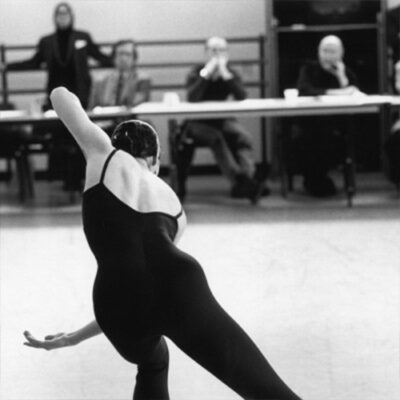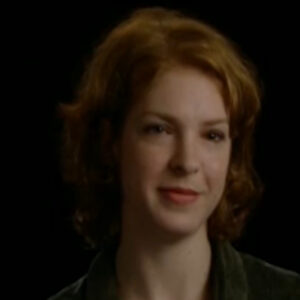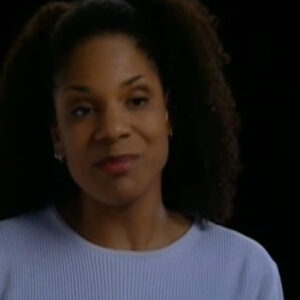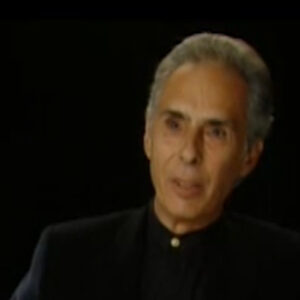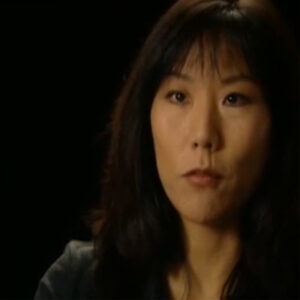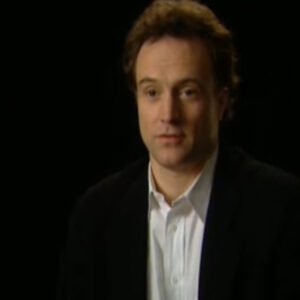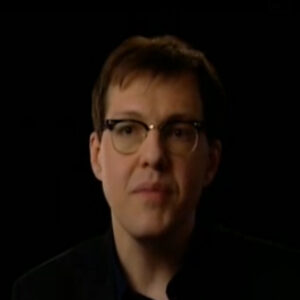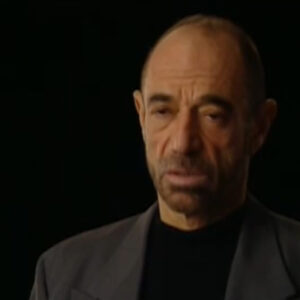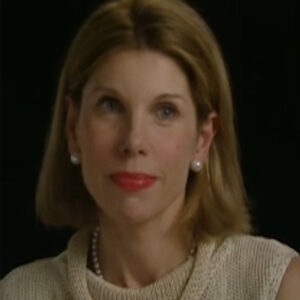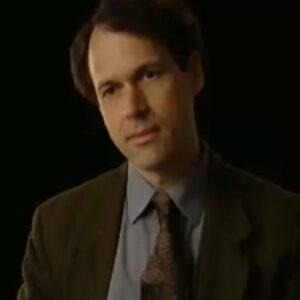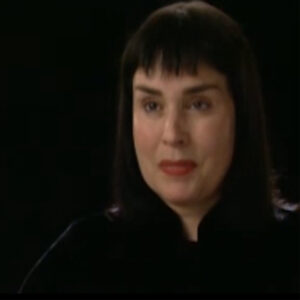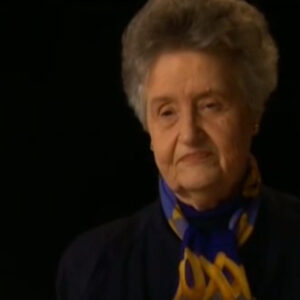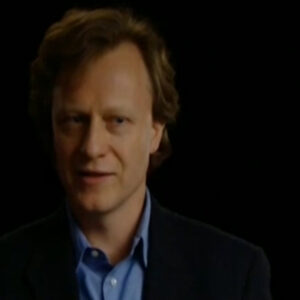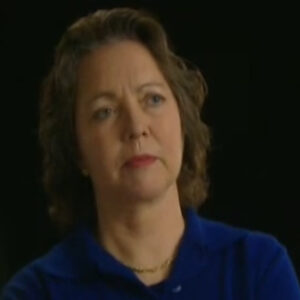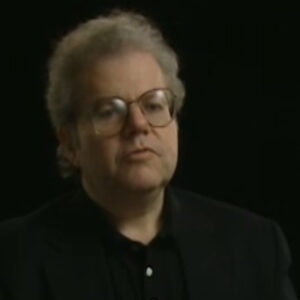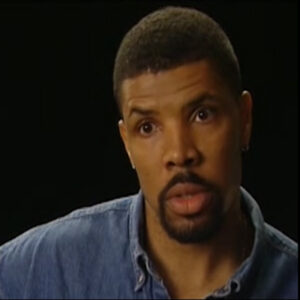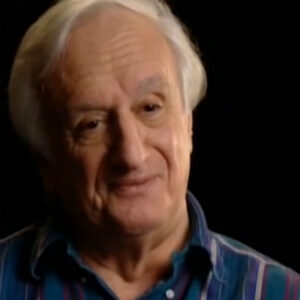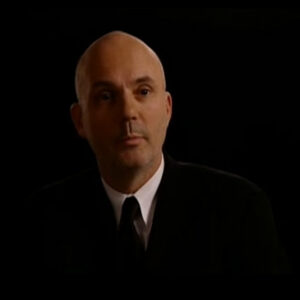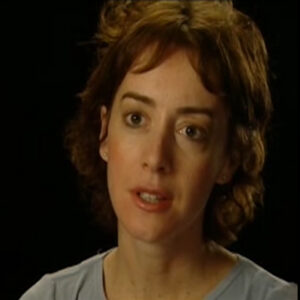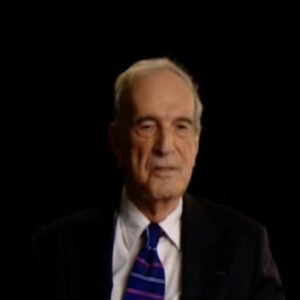Speaker I’ll tell you, Julia. To me was I had no idea or knowledge of its reputation and I only found out about Julia and what it meant after I was in the school, after I was accepted into the school. So it wasn’t something that I had since a young child aspired to. I never even heard of it. I mean, I was born in in Italy, in Rome. And that’s where my initial training started. And then the teacher there told my mother that he he thought that I had a lot of potential and that the state was the place to go for instrumentalist. That’s where you could really get the fine training. So we all moved. And a friend of ours had mentioned this woman named Dorothy DeLay and that she was really a very fine teacher. Never heard of her. I had heard of Juilliard, but it wasn’t anything like I aspire to. Hello. I hope I get to go to Juilliard some. It wasn’t anything like that. And we had nowhere else to turn once we came to this country after after going to Curtis for a little bit and again, kind of outgrowing the mold that was established there. Well, let’s try this delay, lady. Never even heard of her. Let’s just go and see what happens and take an audition. And that’s what we do. It came to New York. Waited in the lobby of Juilliard. And here she came. She was late. Believe it or not, she walked into the lobby and I saw this woman that I mean, it was certainly not what I had pictured and I played for her. She must have seen some kind of potential. She invited me to audition for the pre college department, and I did. And I was accepted. And then after I was in school for a while, I realized, oh, my God, I’m in Juilliard. I mean, this is really great. Is this Juilliard?
Speaker And what what was your audition like? What was what? You must be playing at a very high level already at that point. I mean, how old were you?
Speaker I was. I remember being. I think when I played for Mr. Lay and for the audition for Bricolage, I think it was 14 years old. And I you know. I don’t know that I was at a high level. I think what Mr. Lay saw was. Talent and potential. I know that I was full of bad habits from from head to toe. Everything I did as far as playing the violin was wrong.
Speaker And to this day, there are a few things that are wrong.
Speaker But, I mean, she must have looked at me and thought, oh, my God, this is gonna be quite a challenge. But I think that she has some talent and I think it’s worth the work. But I really was just wracked with terrible habits.
Speaker And in going to the pre college, I mean, there’s like, you know, a lot of stuff going on all day if you end up doing the orchestra doing that.
Speaker What was your Prikhodko routine or did you sort of in a way, as some students I see shuttle into this delay world, that the bricolage, which is sort of a.
Speaker Pre college for me was phenomenal. I remember it so vividly and with the most with the warmest memories, I it’s where I established friends that I still have today. It’s once it’s once a week. I had to come in from Jersey, which I thought was such a schlep. Then there were people that were coming in from California. I mean, it was incredible just to study with her. And yes, because it’s only one day out of the week, you have to sort of cram everything into that day, which means you’re training, which means theory. I think there was piano.
Speaker I’m not sure if we’d take piano minor. Of course there was orchestra. There was your your instrument lesson. And all this had to be crammed into one day. Well, I what I remember vividly was that I didn’t like theory.
Speaker I just didn’t like it. So I went to the first class and I thought, I really don’t like this. And I. And furthermore, I don’t. I don’t understand. So I didn’t go. And this was discovered about three, four months into the semester and I got into big trouble.
Speaker Naturally, I just was cutting theory. So I had an hour free when everybody else was, you know, I was I had an hour free. So that’s where I got my nickname. Flash actually was was because of cutting theory and not going for about three months as a punishment. I had to make up not only start to go to theory again, but make up all the theory I had lost. Now I have instead of one hour week of theory, three hours a week. And so basically I was named Flash because my friends would be sitting around the halls and I would go from one theory class right by him.
Speaker And they goes the flash into my next my next theory class. And, you know, for the next just to try to get to the next class on time, because I had a lot to make up for it.
Speaker I had I have most wonderful memories of bricolage.
Speaker Mr. Lay said she finally says it’s off the record, but she said that she heard a rumor like that you would pull the trigger. Does this true?
Speaker Well, I have to say that if I I mean, honestly, I what is the statute of limitations on illegal thing? Because I did some rotten things that if I had known any better. Being so young, I certainly would not have done. But yeah, I pulled it wasn’t just classes that I didn’t like. I did it for friends of mine who perhaps had a lesson, but they weren’t as prepared as they should be and the like. Oh God, I wish I practiced more this week and right at their lesson time I would go and pull the fire alarm and the whole school would evacuate, including.
Speaker And it’s it was horrible.
Speaker I mean, it was really very. I’m not I’m not proud of them.
Speaker But she said that everybody loved you. She said it all.
Speaker Who wouldn’t love me if you were if you were if you weren’t ready for your lesson? I was the girl to come to class everybody loved.
Speaker Let’s talk a little bit about about the lesson lessons with this delay over there.
Speaker Curious thing to see.
Speaker It’s very hard to see where where the learning. I mean, as one person, one student said, she says, oh, very good.
Speaker I mean, we’re talking about your lesson process.
Speaker It’s it’s difficult to describe. Especially in a short period of time. How Dorothy DeLay teaches. From my standpoint, because first place for me there were.
Speaker Phases of our relationship. When I first went to I was 14 years old, had a lot of bad problems, technical bad habits that I had developed. And I was 14. I was 14. I had no, I wasn’t. I wasn’t thinking yet. Everything was by instinct. I was very rebellious. What she had to do at that point, more than anything, was be a psychiatrist with me.
Speaker I might. My phases of working with her later when I when I was older and I started to think about the process of playing and also think about the fact that. Do I want to do this the rest of my life? Then our relationship changed. And now it’s very different, you know. It’s there are certain things that she does. There are certain methods that are phenomenal and work. But I have to say, I mean, if there’s there’s one thing that I think everyone would agree with is that she teaches each. Even though she has a method, she teaches each student differently, emotionally and psychologically. And I think she will speak to that student in the language that they will hear. So if she sits there and talks to me, a 14 year old, about Will Sugar Plum. Your vibrato is is not varied enough. I’m you know, I have other students that can do a finger vibrato and Dagg to risk brought on and got an arm for broader going in. And you just have a finger finger vibrato. You know, I’m not going to hear this if she’s going to talk to me about. You need to do this first and then followed by this. Followed by that and end with this. I’m not going to hear it. I simply won’t hear it at 14 years old. And I wasn’t that kind of a student. So she knew how to talk to me, how to make it seem like it was my idea, how to make it seem like it was a really good idea if I did this. Oh, I did this. Then I’d be even cooler than I am now. Extraordinarily smart that way.
Speaker When you mean when you talk about things that you have bad habits. I mean, can you show me just a little like when you’re like what we’re talking about, like risk changing or I’ve seen or do a lot of stuff. She talks a lot about.
Speaker You just want me to take this fiddle out, right? I don’t take it. Well, I just. What. What do you mean.
Speaker I like it was you immediately without the bill, you held your arms up yourself.
Speaker When you say I had these bad habits, I was like, what do you mean exactly?
Speaker Well, as far as holding the violin up without you, you know, with your as much as you should with your with your chin instead of with your arm, you have to have your arm free to do everything it needs to do. So this is correct. I mean, this was one thing that I actually had done correctly. But I remember that my left hand position was like this, that my wrist was up like this, which is horrible. You have no mobility, no freedom to do anything. I mean, this is this is the correct position. I played like this a lot. My thumb was way up here. It still is. That’s wrong. Also, it’s a prom. And plays like this is slum’s way up here. It’s like waving a flag up here. It’s wrong. It is literally wrong to do that. However, if it works for you and you make it work for yourself and there weren’t changes that I have that I had to make and I did, but it was with great rebellion. Also, my as far as my Baum was concerned, this was never bent. My thumb was never bent. I was kind of clutching the bow more than commanding it.
Speaker I was very tense and my bow tended to decline, tended to go like this.
Speaker So I was how I played, you know, and and yet I played I was able to play these concertos. I was able to be accepted into Juilliard. But I think sheer talent or potential that they must have seen, because when I think of the position I had when I auditioned for, I can’t even imagine getting through the piece. But I must have somehow gotten through it. And they thought, wow, man, you sure shoes doing everything right should be pretty good.
Speaker So do you talk about a little bit about the classic?
Speaker Can you talk a little bit about what I think is it is a big discussion in the early years starting so young. That is how and how Juilliard sort of help you in it. What I think would be a world. You love music. I mean, you start so young in order to be playing at the level you’re playing by working and then you’re sort of in this catch 22 because you going to practice all the time and, you know, to get you to that next level. And how are you? How is your eye?
Speaker If I’m explaining myself correctly, it’s like now they have this guy, Don Green, who comes in and works and tries to get people to, you know, sort of psychologically keep loving music because they’re such an investment on your part from the heart of everybody’s families on the part of this delay, like not burning out right at such a young age.
Speaker I mean, it’s a it’s the prodigy catch 22, right?
Speaker I have. Very strong opinions about this, and it’s so strong that I. I really need to be disciplined and choose my words carefully. I will say this. My childhood was incredibly normal and there’s nothing I’m more thankful for than that. I had to practice. My mother made me practice, but I played as well. And it was never I was never a prodigy. Not as not like the kind of prodigies that we know today. Not not the. Annihilation and ruination of these young talents. It’s extraordinarily sad. And a lot of people at Juilliard are responsible. Now, having said that, my experience was very, very different in that when I started to actually play some context that meant anything that weren’t little local things that, you know, your grandma comes to. I was 17, 18 years old, and although I must have displayed a lot of talent and potential, you know, I played I played when I was 10 years old with the float of Yorkshire, but that was a children’s concert. I played one movement of a Bach concerto. And I played it like a talented 10 year old. I didn’t blow everybody away. Certainly wasn’t playing Paganini at eight years old. I mean, no way. So my my growth, I’ve I feel now, looking back and thankful for it was nothing spectacular. It was I was not a prodigy. And I’m an I’m very happy about it. Very, very happy about it. And I see now lots of the level of violin playing keeps rising to the point where now we have very, very, very young people playing extraordinarily technical, demanding pieces. And what can you do with them now? Now we’re hiring people to teach them how to play. Teach them how to have fun. Teach them to put their instruments away and go outside and play kickball. That’s sad. That’s why it is.
Speaker And do you think that when you say Julia are responsible for that?
Speaker I mean, in some ways and you think that’s because they have to live up to their own reputation now means the same thing. And it’s like the same sort of cliches in the film business. Two or four actors. I mean, it’s like if you’re not 17, if you’re not, you know, directing your movie, by the time you’re 30, you’re like, oh, I’m not keeping up.
Speaker I’m like, you know, everybody has to be so young. And you think that is.
Speaker Is this Juilliard in a way caught in its own culture, in its own trap that, you know, once you once you put up the maturity, then you’ve got to have the other.
Speaker I mean, I think that Juilliard and certain teachers at Juilliard.
Speaker Made the same mistake that any institution and any person would make, and that is no hindsight whatsoever. A talent comes along who happens to be very young. You’re impressed by that talent. You want to own that talent. You want to develop that talent and that talent goes out there and that sets a precedence.
Speaker It may be a fluke. It may be a freak. But that sets of precedents and that precedents then becomes the norm. And that’s the mistake. That’s the mistake. And like, well, well, we had that kind of a talent and she was 10 years old and. Yeah, but you should hear this one now. This one’s coming from such and such a place, and this one’s eight years old. And so without any foresight at all. They jumped on the bandwagon and then it becomes something that I feel anyways is quite dangerous.
Speaker And the other thing that I think probably comes out of it, I’m sure you’ve thought about this a lot, too, is that you can play maybe you can play music, maybe you can whip through the you know, what you’re playing. Can people can you in your can have I mean, what are you thinking. What is it meaning. What is it. I mean that’s a whole nother.
Speaker I think what happens is trends happen historically in because there is now such great. The level of playing is technically is so high at such a young age that the pressure now becomes on. Well, I’ve got to be able to play when you ask you f sharp minor. Bye bye. My kid’s got to be able do this by the time he’s seven because so and so does it. And so and so’s. Neighbors got a six year old who can do it. And that’s really that’s terrible. I mean, in my experience are very few adults that actually are thinking about what or what they’re playing. You know, as I travel around and teach a lot of master classes to college level students, even I see in them, like, what are you thinking about when you’re playing this piece? What does this piece mean to you and what is going on in your head now? Certainly a 10 year old. What could possibly be going on? An 18 year old, 10. You know, those kinds of things have to be developed. They have to be drummed in and they have to be reminded because they’re so young that there’s more to this piece, even if it is Vinnie Baffsky, who’s not the most profound composer, there is more to this piece than getting those opening cents. There’s more to playing your instrument than playing in tune now. Now, this is important. It’s absolutely important. There’s more to making music than what you know right now. And you may not feel it. You may not be able to work it out in your head. But I’m telling you as your elder that there is more to it than this. So when the time comes, you’ll learn that you’ll learn this and you’ll learn that in in its time. But don’t think that you’ve got this mastered because you play this in tune. That’s a mistake.
Speaker You talked a lot about at some point.
Speaker I guess I saw both speaking in strings and I read about it this kind of famous period of sort of quitting, stopping, stopping for seven months, deciding that you weren’t going to play for a while.
Speaker Is this following your daughter? But I’m putting down the instrument, sort of getting this ultimatum for Mr. DeLay.
Speaker And you must go back. You know, it’s all around the time that you were doing. No. What is that what you’re sort of going on in that period of time?
Speaker Well, I was about 18, 19 years old, and I was, I think, a typical 18, 19 year old, very confused about my future. What I. Should do what I thought I could do. How is how much could I invest of myself in this? Do I want to do this for the rest of my life? Lots of things happen when you’re 18, you know, 16, 17, 18, you fall in love. You have other interests. There’s this. There’s that. There’s that. There’s this. And I mean, the last thing on my mind was playing the violin. And so I was very I was confused. And because of that, I stopped playing. I just kind of put it away and thought. And I went to lessons with Mr. Lifeforce up upwards of six, seven months without my instrument at this point in our relationship. She was a surrogate mother, a very, very good friend.
Speaker I had.
Speaker Input from my friends, input from Mr. Lay. Input from my family. Input from what I read in the papers and what I saw around me. And it was just a sponge. And I took it all in until the time came when I. I really felt like I had to make a decision. And luckily, Mr. Lay helped me make that decision by.
Speaker I think she figured, you know what? She’s been confused long enough. Let me push the envelope now and see which way she’s gonna go. Because I could eat. I could have gone either way. I just completely quit or do what I did.
Speaker And so she basically said to me, after all this time. I want you to come to your lesson next week with Prokofiev contract, I can’t remember which one it was. But you want to me to be bring an entire movement of Prokofiev concerto memorized, which under normal circumstances is just fine. No big deal. However, I hadn’t played the violin for over seven months, so I don’t even have the music, you know. So I think she just pushed the envelope that way and said, I’ve had it. I’ve had it. I’ve had it up to here. Now you have to make a decision. And that’s what happened.
Speaker And, Suzanne. Came in with a piece prepared.
Speaker Yes, I. Part of me. Was.
Speaker It’s sick of sitting around thinking about my future, I got a little sick of myself as well. A huge part of me missed playing the instrument. Not what I thought. You know what? My future in this and that. I just miss making music. I’ve always loved to play. I’ve never loved the discipline and the practicing and the net and all that. And certainly now that I have a wonderful career, I certainly don’t love the lifestyle. But I always loved to play and I miss playing a lot. And between that and Mr. Lay’s ultimatum, I mean, you know, misplaces very, very sweet, kind woman. And she just basically said, bring me this next week or I’m kicking you out of my class. And you have to understand, we all feel that missals our mother. We all feel like we’re her favorite. You know, she has a way of doing this. And I certainly was no exception at the time. So I just looked at her and laughed. Well, what? You get nasty now? You’re gonna spank me now, you know? And she simply said, I’m not kidding. And she closed the door. So I was like, well, I was a little scared. I was all scared. I think she probably close that door. She was either going or. I, I certainly was not expecting that she she got real strict with me just like that.
Speaker What do you think about the whole you know, the whole element of what a conservatory.
Speaker What studying music like that can give you? I mean, you were talking before about coming in with the potential, but there’s this kind of giant myth of the conservatory and you go into Juilliard. Juilliard is what’s making new.
Speaker You know, the artist, but it isn’t. I mean, what is this sort of the myth of the conservatory and the talent? I mean, what you’re think what you’re saying in ways they’re giving you, they’re seeing the potential, but they can’t really take you from potential to an artist to be the artist.
Speaker And if no, Julia could not in no possible way have taught me what I needed to know about my career and what it entails. What Juilliard or any institution can do is provide you with the basics. And the thing that made the biggest difference to me. My friends, my colleagues. The other students that I went to school with in my class, how they influenced me. We would sit down and talk about music. Now, when you go to a class, they have to teach you the history of music. They have to teach your dates. They have to teach you this and that. You have you know, you have to spend that whole chapter on the Sackbut. We had to this. That’s an instrument in your training. They have to teach you that. And in theory, they have to teach you that. You have to learn these basics. But there is no conversation, intellectual stimulus, stimulating conversation about music that you get with your friends. And that’s what influenced me more than anything. Talking to a fellow DeLay student about how he was able to master this octave shift. Was what got me thinking about doing it and trying different things. The talks that we had on Orchestre break in Stairway E in the cafeteria. In the subway, going to school or walking around the neighborhood. That’s where I got my stimulation for music.
Speaker And are many of the friendships you were saying and even in speaking in strings, everybody’s sort of showing up in Aspen together? I mean, these are relationships. These are I mean, how. Do you think part of it is the time, the age, the commonality of where you are?
Speaker You know, I have to say I probably everybody would feel this way about their amah matter, but I.
Speaker One, when I was a student there.
Speaker Every single person I know now, when I think back on it was so individual, was so unique. I mean, not one of us was even similar to another one.
Speaker We each had very strong opinions about everything under the sun. We all looked different. We were some of us, quite rebellious and not afraid. Not nasty, but naughty. I don’t feel that they are now, and I’m sure everybody would say that. I think that’s partially the reason why I am so. Open about music because of the people that I went to school with. They were all. So vibrant and stimulating and different.
Speaker I can’t stress different. We were so different from each other and yet we had this one thing in common. This one place that we went to in common.
Speaker You know, because, you know, apparently at Juilliard, they were making jokes saying, you know. This Veda Kaplinsky, the piano teacher, was saying that she when she came. They said they said like at what age do you expect to retire?
Speaker She said, Well, what should I write here? They said, retire. No one’s are cranking out in a coffin. That’s right. There’s a kind of a loyalty to that. What do you mean?
Speaker Well, there’s no mandatory retirement age for musician. I mean, it’s not you know, we’re not dancers or actors. You don’t have to retire as long as you can play as long as you can do your job. There’s no you know. Well, you’re sixty five.
Speaker Did you feel that there? Did you feel that there was a lot of.
Speaker A lot of people there, though, who were maybe, you know, sort of. Hold out from the path.
Speaker Let me let let me say this as far as as far as age is concerned. We had to play juries every year, which is basically a way for the faculty of that particular instrument to just keep a keep an eye on your improvement and. You know, of course, I cannot and will not mention any names, but I will say out of eight or nine violent jurists. Four were definitely sleep. Without a doubt. I mean, she knows in a way which was great.
Speaker I don’t mind.
Speaker Did you did you study with other people there besides you? I mean, is this sort of school that you have speak of like other other teachers, other.
Speaker I mean, were you thinking. Was she having a lot of people come in? Were there master class settings that you can recall that were really interesting where other players came in?
Speaker Well, you know, I remember you have to remember that when I was when I was a when I was very young, I went to Curtis. And when I was a Curtis, there was a definite mold there. But what I did go to New York periodically to play for glomming on. Who was DeLay’s mentor, you know, and because I was too young to study with him on a regular basis, I would just play for him. And I you know, later when when I grew and started to think about it, it was amazing to me that delay came from that, you know what with her. She really broke out on her own style. She would bring in I I mean, I studied with Dorothy Delaine and I studied with some of her assistance. I started with Yun’s Ellerman. He was phenomenal. Baum teacher. They were not the most exciting lessons because learning WBO technique is not the most exciting thing in the world. And, you know, you’d have to just bring in these a TUJ and do like. For like an hour, I mean, it was like. But I remember Yun’s very well and I studied with Marcel Kawasaki, who is another one of her assistants, who was I just can’t say enough about myself. He’s phenomenal teacher. But she did bring in every now and then a famous violinist to just listen to some of her kids and also maybe teach a bit. And this happened quite a bit. Also it at Aspen. So I remember playing a Brahms concerto for Get On Kramer. And I remember playing a Brahms sonata for Pinkert Zuckermann in Aspen in a master class. And I remember playing Carmen Fennessy for It’s Up Roman in Aspen.
Speaker And I remember that very well.
Speaker And why do you mean what was it about? About prom. You know, he’s now teaching full time and of course, he and DeLay have this incredible connection. What? He was interesting because his hands are so big.
Speaker His hands are huge. He’s like a mutant. Could you get those hands? Cheese husk. He can play like a a B flat on the string and like the like the top note on the East Room, the guy’s hands. You just have to laugh. I remember playing for.
Speaker It’s a prominent Aspen. I was petrified. I. I don’t even know how I was able to control my bowels, honestly. Because it was promised and also I was playing Carmen fantasy. But you know what, God just had nothing to do that day. He was so with me. It was the best I ever played the pieces. To this day, I can’t play as well as I put it that day. And because it was the Perlman class, it was it was held at the tent was lot of people’s full and and it’s OK. Broman is among many, many things is hysterically funny man. And so not only would you learn from his classes, but you would laugh. And that’s always a wonderful environment. And I played very well.
Speaker I was very lucky that day. I certainly wasn’t because I had practiced so much. I just got lucky. And he was very kind to me and I’ll never forget it. He was really he made me feel like I was a good fiddle player. And that was a very special moment for me.
Speaker What do you think the relationship is between.
Speaker And dark, she talked a lot about having been here. I mean, you knew that she had this history of players, that you were you were you were going in that in that line with these. Right. These players to talk a little bit about that kind of.
Speaker Well, for you know, for those of us who studied with her and there was the next older generation or two older generations of like like Itzhak who we knew had been her student. And, you know, this was very hopeful for us. Like, well, he’s great, you know. So if I don’t play well, it can’t be her fault because he’s great. So you always felt that that’s what you aspire to. You always went and heard them play when they were in New York. And, you know, if you were lucky enough to play for them, then that was a great honor. I think that Mr. Lay has always there was always beaming with pride whenever she talked about Itzhak and she would always talk about it, socan the lessons, you know, Sugar Plum, Itzhak plays it this way and we’d all go.
Speaker His hands are this big. You know, we can’t play. But there was always a great deal of pride.
Speaker And I think that there was it and it probably still is a huge soft spot for him for a variety of reasons, which I don’t know, because they have their own relationship. But it was very clear her feeling about Itzhak was always one of great regard, great warmth, great respect and great pride.
Speaker What do you think? I mean, this is a vastly sort of ethereal question.
Speaker But I mean, talk a little bit about adopting the joy of playing and playing.
Speaker This is something I mean, you’ve talked openly about, you know, it’s it’s not a scandal. It’s not. You know, it’s not the years. It’s the mileage kind of a thing.
Speaker I mean, what is it about it and where. Where did it come from so early on for you? This sense of music is as your expression. And how did Juilliard. How did your education and why keep that keep that going for you?
Speaker This is an impossible question to answer. I mean, it’s where do you get. This love of making music. I don’t know. I’m sure a lot of it is genetic. My mother was a pianist. My father was a singer. Everybody in my family played some sort of instrument. Music was constantly happening. Now, this was not the case with a lot of my friends and colleagues whose parents. Objected to them wanting to learn an instrument because let’s face it, you can learn in instrument, you can become a master at that instrument. And there’s no guarantee when you get that diploma from Juilliard that you can have a job.
Speaker And so as a parent, I can certainly see that. But that was not the case in my family. I was never discouraged from playing. But that, I think, is a huge thing that you grow up with it. I grew up hearing so much different kinds of music. My my grandfather introduced me to opera. The biggest influence in my musical life, the drama, the totality of opera is very much the way I play.
Speaker And that’s, you know, it’s not my fault. That’s that’s what I heard when I was a kid. My brother was listening to Led Zeppelin. My grandmother was listening to Sergio Frankie. I would I would hear my mother teach piano lessons. So I was hearing like Churney over there. And, you know, the music was constantly happening in my house. My love of music must have come. From that, my mother says that when she would watch me listening to music as a very small, even a toddler, she recognized she recognized that it was the sense. My years that would always affect me more than anything else. And that has stayed with me my whole life. I am more affected by what I hear than anything else, any of my other senses. Being a Juilliard.
Speaker What I what I was able to develop and I didn’t know at the time and just sort of happened in and when I think back on it is the sharing of that music with your friends? Yes. There’s this thing about learning. But, you know, we’re kids. We don’t want to learn. We want to go to class. We want to do the homework and allowed practices peace out. But when you play the music, that’s why I always loved orchestra was the putting together of these sounds. Here we have this in our section and my friends over there and the cellos have that and that section, when you put it all together and you hear it happening. For me, it was like eating a fantastic meal when you’re starving. I mean, it’s just always been that way with me. I don’t know any other way to explain it and just developed to Julia because I was able to share it, whether I was playing a sonata with somebody or in a quartet or playing a Mahler symphony and orchestra. I was making music with my friends and there was nothing greater.
Speaker And in that sense, you think that’s is all about your way with somebody in the hallway or people up there? Can you just go?
Speaker Either the people have change, the environment’s changed or what? And gave you your vague you’re wrong because you’re not there. But I mean, what is your what is your sense when you visited and and you did go back and visit? I mean, how long ago you were saying you that’s sort of two different stories, but that you picked up your lessons again.
Speaker It was at some point quite recently, the last couple of years, you decided, I want to go back, I want to have lessons, sit down and wait for hours.
Speaker Well, I will. I will. I have to say that it’s very possible that I’m very wrong about this. It’s just a feel, an aura, a vibe that you get. I it feels like an institution more now than it certainly did when I went to school there. It’s. Let me put it to you this way. Our cafeteria, when I went to school there, we had like one little pie that was four weeks old.
Speaker And next to that, maybe you could get a grilled cheese sandwich and maybe a hot dog and and cottage cheese that looked like, you know, you wouldn’t you wouldn’t even let your dog pee in it. You know what I mean? This was our cafeteria. I loved it. Now there’s a salad bar. You know, I’m like, why are you walking? Wow. Look at all these seats. And every I mean, we we just and we had some couple of plastic trees, and it was it felt more intimate when I was there. But again, it’s probably my perception, you know. I see I, I don’t see anybody doing anything naughty. And Julia. Now.
Speaker And I don’t know the probably the problem, sure they are. I hope they are. I hope they are.
Speaker And when you went back, when you decided that you wanted to sort of reinvigorate yourself with more lessons and you actually, I don’t know, I would trying to think where I read this or heard this, maybe it was in the film that you talked about going back and sitting down and waiting, waiting out in the hallway, which some people, I notice wait all day for Mr. Right.
Speaker You know, they sort of sat there. But then she kind of comes in at some designated point. But why did you feel that that need to reinvigorate with lessons? And what was it like when you went back again?
Speaker I had decided to go back to basics. At one point, I don’t I’m sorry, I don’t remember exactly how old I was, but I mean, I was already having my career and going around and playing stuff. And between doing that at Juilliard and also at Aspen, just to study with Mr. Lay again, just to go in and bring in. You know, I would come back from a tour and then I’d bring her a G major scale. I it was I decided to do it because I felt I needed it. As always, when I heard my colleagues playing, doing something I couldn’t do. That was my motivation. And she knew it. That was my motivation for then fixing that technical problem so that I could also do that. And this the pressure of my career, I was always, you know, somebody gets a break. They want a competition, whatever. And they burst onto the scene. Either they’re gonna become. Worried or are they gonna become lackadaisical? I went I went the worried route. I’m still at the worried route and I’m grateful for it because I keep thinking that’s not good enough. It’s not good enough. Your plane is not good enough. And so this is what happened to me at that time. And I wanted to go back and start doing some basics that I had not learned or I felt I had not learned. And so I did. I went back and I would sit in that same couch. We used to find dead mice underneath their couch. And we were like, they were all stiff. You’d hold them by the tail and they’d just step off of it.
Speaker They they had atrophied. And I’m sure that’s not there anymore.
Speaker I sat on that same couch and students all sitting around waiting for Mr. Lay to show up. Some things never change. And I was grateful for that. And some of the students had no idea who I was. And some of them did know and thought it was off. The strange that I was sitting there waiting for a lesson like they were it was a little bit hard for me. You know, as far as my ego was concerned. But I just remember feeling like I had an upper hand because I knew more about what these kids were working towards than they did. I knew because I was out there doing it at that point. And then to go into the lesson, to close the door, to have my my time with Mr. Lay and do basics when she also knew that I could go out there and play Tchaikovsky Violin Concerto, Carnegie Hall that night. But let’s work on this G major scale. This was very invigorating, very vibrant for me. I really liked that time a lot.
Speaker Flood.
Speaker How was it to sort of leave this this safe haven? The group of friends?
Speaker You really did, you know, pile out of school after that. Now, Verkin, I mean, that must have been the snapping moment for you career wise. How I mean, what was the what were those first years like? You really quick hold up. You know, that’s a Big Sur. Oh, yeah.
Speaker Sounds like an. I mean. OK.
Speaker In 1981, I won the. No competition. I was it was in May and I had just completed my second year of college. I went back to Juilliard the following year. But not that I was ever a phenomenal student. Then I really started to fall behind in classes because I was travelling. Now I was playing concerts. I was contracted to play concerts. I had a management. I was starting this career and I was falling behind in classes. So at the end of that year, I dropped out of. When I think back on it, there’s nothing else I could have done. I had to pursue my career. But if there would have been another way, I would have taken that because I. I didn’t I wasn’t ready. I wasn’t ready. And I don’t know that I would ever have felt that I was ready, but I certainly was not ready at that time. And so I went out on this career without enough training, without enough knowledge. And I had to learn, learn on the job. And if there’s one thing that I regret is that I wasn’t more disciplined when I actually had the time to be a student, when I had the time when I had hours to go to the library and research things and and be a student in practice, because then my life got so damn busy that I there was hardly all I could do to just get two, three hours of work and every day so that, you know, I’m I mean, not like you asked for advice or anything, but I would if there was some way I could impart on a young young person to cherish that time when you are in school with all those things around you all the time. The vibrant, inspirational things around you to learn from. Take advantage of that.
Speaker And in this, I talk a little bit about your relationships to people. I mean, in terms of being there. A lot of other stuff going on, not even outside of music. Did you even get a chance to engage in that hook up with other people?
Speaker As you know, every in Juilliard, did you have your. I think anywhere and any college, any place, even in the workplace. I mean, you have your click of people that you hang with. But the world, really, the world, meaning Juilliard came together in the cafeteria. That’s where everybody went to eat. We would see actors coming in and out all the time. Now, extraordinarily famous actors I saw coming in and out and having, you know, whatever coffee smokes, the dancers came in, got their carrots and smoked.
Speaker They always smelled they that, you know, the brass guys would hang by themselves and the string players would hang over here. But I mean, if you just took a look around in that room, there was an awful lot of varied talent happening. And that’s for me. That’s why I loved the I majored in cafeteria.
Speaker I love the cafeteria just to look around and see everybody trying to learn their craft and trying to mentally mess around with their colleagues and stuff. It was always a lot of fun to watch.
Speaker Do you think in retrospect, the door was very good? Right now the doors have, you know, taken that late into the night?
Speaker I can’t you know, I my only experience with dorms are the dorms that I had to stay in as a delay student in Aspen. And there’s like all girl dorm or all delay dorm. And my memories of that were just great because we were all naughty and constantly breaking the rules. I mean, we lived to break the rules. I lived to break the rules. So I don’t know now that there’s this dorm at your. I mean, I look at. My God. I mean, let me tell you something.
Speaker When I got when I got to Juilliard, I had no money. None. No money at all.
Speaker I used to and I admitted I used to go into supermarkets and, you know, take a little chicken leg so that I had something to eat for dinner. I mean, take it, not pay for it. We had no money and I lived in one room on Seventy First Street with three other girls. We each had a corner. And you know what? If one of us had gas to, too. That’s the way it was. We had a corner. That’s all we had. And we shared this one room not only with ourselves, but with a lot of roaches. And that’s all we could afford. You know, that’s that’s the way there was that struggle feel to it to, you know, that that four girls and one bathroom candidate was it was mayhem. But now there’s this dorm there. And I can’t I can’t I, I suppose it makes things easier, gives it some semblance of structure and stuff. And I guess there’s some naughty things going on in that dorm, but I certainly don’t know anything about that. I mean, that wasn’t my experience earlier.
Speaker Were you living with these three other girls, three of the girls from Juilliard?
Speaker Yeah, three of us from Juilliard. There was. Let’s see. This a three three violinists and a cellist.
Speaker Do you have a memory of a great performance, things that you saw?
Speaker I think I mean, things that you were involved with playing or things that maybe that you just went and saw there, that you had a kind of a.
Speaker Kind of a response to performance or even a practice or something that went on at some point that really had that kind of like a ha kind of like moment for you. Come here.
Speaker This stuff that’s going on here. I remember. I.
Speaker They had. I’m sure they still do these internal competitions that, you know, your teacher would submit you for. And you’d go out and audition for. And it was it was you know, it was the Tchaikovsky International to us. I mean, for you joining edition so that your friends are and my. My memory is that the person who deserved to win never won, except for once. And hearing that concert was a kind of a combination of for me why why we’re there, why we’re practicing to be able to play that concerto like that onstage with an orchestra. And get that kind of a reaction. And I do remember one performance. Of Mahler’s Seventh. And I was just in the orchestra. But the preparation for this performance, it was conducted by Jimmy Conlon. And it was going to be aired on the radio. So the the preparation was intense. He took it very, very seriously. We had sectionals. I mean, we just rehearsed crap out of this piece. But the performance time came and we were all like this. We were all we knew our parts because it was forced down our throats. We had to learn those parts. We were so excited. And I remember hearing the broadcast on the radio and thinking, my God, this is phenomenal. Is a student orchestra. It was phenomenal. And there are certain performances there that made it very clear why were there. This is why this is the result of why you’re doing all of this. And that was always terrific.
Speaker I remember that. I think they have a way of exposing you personally, of being out of being accessible. That brings people to music that.
Speaker I guess that I’m sort of leaning towards this sort of that the audience of classical music is is suffering intensely, you see on these kids. And what what world are they? Are they going out? Into. You’re out there. They’re all in there focused on peace. We’re focused on. And I think the world is changing around them.
Speaker It is some I, I can say that I am most grateful that I am not starting out right now. If if if I had the chance to take 20 years. Off of my age and go back into that school, I wouldn’t do it now. It’s some. The Klatt, the arts, the industry, the business which you learn whether you want to or not, is very different now. I see parents schlepping their kids from Canada and all over the place for those Saturday morning lessons. And I feel almost melancholy because it’s not the same.
Speaker What is awaiting them could be vastly different. We are in this country especially fighting to keep life performance still happening. You know, there are so many advancements in technology. God knows if we’re even ten years from now going to have these symphony orchestras and and solos coming on stage and playing. I mean, the recording industry since I started making recordings has changed so enormously that I can’t even begin to explain. So these young kids, eight, nine, 10 years old or 18 or 20 years old, maybe just getting a degree. I wish them luck. It’s it’s a shame that the arts have to be supported by the government. It has not happened yet in this country. I’m sure it will. It will. The pendulum will swing the other way. We will realize that. What what does the country have to offer besides a great army? I mean, you know, we have to show more for ourselves as Americans and support it more so that there’s more that there are more openings so that kids can go in there with a different kind of hope. Because now if you take the same route as I did, it’s not going to happen for you.
Speaker Well, that’s another you know, we talked about the route that you’re you’re right that, you know, lots some water. I have some. OK. OK.
Speaker The solo route. I mean, the solo routes very hard. I mean, do you feel that when you were at Juilliard or even now that there’s a lot of people.
Speaker You know, everybody wants to be everybody’s eyes on the prize. And then, you know, for a lot of people, 90 percent of the people, 99. It’s not going to. What about these other lives that are possible? You know what’s out there?
Speaker Well, you’re asking me. You’re asking me a question I can’t answer. I mean, when I went to school, if one out of 100 kids was successful as a soloist, that’s amazing. And I’m telling you, it’s much less now. I mean, it depends on your instrument. A trombone player that’s going to Juliar is not is not out is not going to Juilliard to be soloist.
Speaker But every pianist, you can be sure, and every violinist. Oh, you bet. Very, very few went there to learn how to play their instruments or that they could be in a quartet. When I went to school, it’s an option. And it may be the first option for some players. But when I went to school, I don’t I didn’t know anybody who that that was their aspiration. And today it’s even harder. So what’s available? Well, we have to keep the orchestras alive so that we you have that available for you. We have to keep education in the in the schools alive so that there’s the possibility to teach what you have learned to Juilliard. And continue this knowledge. There’s chamber music. But as it is, that’s tough enough to book. I mean, I’m being very blunt and honest about the business and all of it has to come. We need we need more help. I mean, we need help from the government and we need help from home. People have to be better educated to know that this is a necessity, not icing on the cake.
Speaker I mean, I sort of already asked you, this isn’t going to care about somebody, would you send them into this to this life?
Speaker And and so many people that are there feel they don’t. It’s a choice made for them by a fire hire.
Speaker You know, it’s something they’ve got to do. They’re there because they’ve got to do it.
Speaker You know, do you think that you would have had a satisfying. I mean, do you think that it would have been a big blow or a big emotional step for you to take down, say?
Speaker I’ll be part of this.
Speaker I’ll make music in another way or when I was a student at Juilliard. I never even thought about being a soloist. I just went along with. My classes and my classmates. And even an entry number was a way for me to become more at peace with my instrument. Not to. The reason I entered no was not to have a career, not to have a solo career, but was to confirm whether or not I was going to continue to play the violin. And I’ll tell you my memory of the of my classmates, maybe there were three or four, including myself. That had to play. Even though there were many of us, I could see different options for most most of my buddies. But only three or four of us. There was nothing else we could possibly do. We would just starve and play in the subway. But we had to play our instruments. We had to make music. And I don’t you know, I don’t know what the average with the ratio of that would be now, but it is a very you’re entering into a difficult domain, even if you get accepted into an institution like Juilliard. And if you don’t if you have to think about whether you want to play your instrument or not, I’d say don’t. Not at this point. Not at this point in time. Not at this point in history. It’s too it’s too frustrating. Even if you’re total success, it becomes frustrating that the constant struggle to get people to. Open up to the arts particular’s.
Speaker Do you think that Juilliard is in many ways? Exactly what it’s cracked up to be, so to speak. I mean, do you feel that if you.
Speaker I feel that there’s a kind of myth about this, about what what the conservatory is and then what it really is. When you’re there, you know, you sort of cross the threshold and it’s. And it’s not that I mean, what do you think created this?
Speaker This?
Speaker You know, in terms of American Conservatory’s, it’s it’s it’s the one with the hot with the sort of the biggest ivory tower.
Speaker Yes, it’s the biggest. I believe it is the biggest. Conservatory institution for lots of reasons. But I think that. Any institution, any conservatory is only as good as its students. And that is not to say that you only except the ones that are. Extremely advanced. But that you accept the ones that are interesting, that you accept the ones that are unique and individual, and because you can’t teach that you see no institution, no matter what their budget.
Speaker And this is an argument I’ve always had with Mr. Lay can teach you that you can teach a kid how to play an instrument if they’re willing to learn. And if they’re disciplined enough, you can teach them how to play their instrument. And you can teach them how to dance. And you can teach them certain methods of acting. But you can’t teach them. How to thrill an audience, how to get people in a live performance excited and want to come back. You cannot teach them. No institution can do that. No teacher can do that. So. I am of the belief that.
Speaker Any conservatory should take care in those preliminary auditions to accept the vibrant and the interesting, because you can always teach somebody how to play into.

